美国诉尼克松案要点
法律至上经典案例(3篇)
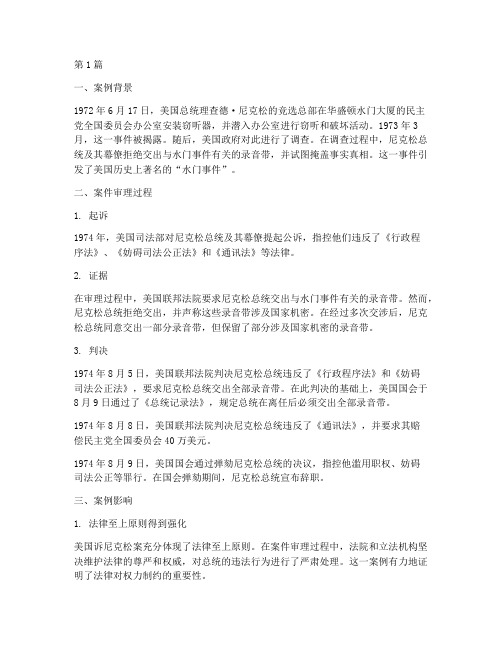
第1篇一、案例背景1972年6月17日,美国总统理查德·尼克松的竞选总部在华盛顿水门大厦的民主党全国委员会办公室安装窃听器,并潜入办公室进行窃听和破坏活动。
1973年3月,这一事件被揭露。
随后,美国政府对此进行了调查。
在调查过程中,尼克松总统及其幕僚拒绝交出与水门事件有关的录音带,并试图掩盖事实真相。
这一事件引发了美国历史上著名的“水门事件”。
二、案件审理过程1. 起诉1974年,美国司法部对尼克松总统及其幕僚提起公诉,指控他们违反了《行政程序法》、《妨碍司法公正法》和《通讯法》等法律。
2. 证据在审理过程中,美国联邦法院要求尼克松总统交出与水门事件有关的录音带。
然而,尼克松总统拒绝交出,并声称这些录音带涉及国家机密。
在经过多次交涉后,尼克松总统同意交出一部分录音带,但保留了部分涉及国家机密的录音带。
3. 判决1974年8月5日,美国联邦法院判决尼克松总统违反了《行政程序法》和《妨碍司法公正法》,要求尼克松总统交出全部录音带。
在此判决的基础上,美国国会于8月9日通过了《总统记录法》,规定总统在离任后必须交出全部录音带。
1974年8月8日,美国联邦法院判决尼克松总统违反了《通讯法》,并要求其赔偿民主党全国委员会40万美元。
1974年8月9日,美国国会通过弹劾尼克松总统的决议,指控他滥用职权、妨碍司法公正等罪行。
在国会弹劾期间,尼克松总统宣布辞职。
三、案例影响1. 法律至上原则得到强化美国诉尼克松案充分体现了法律至上原则。
在案件审理过程中,法院和立法机构坚决维护法律的尊严和权威,对总统的违法行为进行了严肃处理。
这一案例有力地证明了法律对权力制约的重要性。
2. 政治体制改革美国诉尼克松案促使美国政治体制改革。
在案件审理过程中,美国国会和司法机构对总统权力进行了重新审视,加强对总统权力的监督和制约。
此后,美国政治体制逐渐形成了权力制衡的机制。
3. 民主法治建设美国诉尼克松案对美国的民主法治建设产生了深远影响。
美国法律案例摘要(3篇)

第1篇一、背景1972年,美国水门事件爆发,导致时任美国总统理查德·尼克松陷入政治危机。
1974年,美国国会启动了对尼克松的弹劾程序,而水门事件中涉及的录音带成为了关键证据。
尼克松拒绝交出录音带,引发了美国历史上著名的“录音带争议”。
1974年7月24日,美国最高法院作出裁决,判决尼克松必须交出录音带。
这就是著名的“美国诉尼克松”案。
二、案件简介1973年,美国特别检察官阿奇博尔德·考克斯在调查水门事件时,要求尼克松总统交出白宫录音带。
尼克松拒绝交出,并声称录音带属于总统特权。
此后,考克斯向美国地方法院提起诉讼,要求法院下令尼克松交出录音带。
地方法院判决尼克松败诉,要求其交出录音带。
尼克松不服,向美国联邦上诉法院提起上诉。
上诉法院维持了一审法院的判决。
随后,尼克松向美国最高法院提起上诉。
三、判决结果1974年7月24日,美国最高法院作出裁决,判决尼克松必须交出录音带。
在判决书中,最高法院认为,总统特权不适用于行政过程中的犯罪行为。
录音带是水门事件的关键证据,尼克松拒绝交出录音带,已构成犯罪。
因此,最高法院裁定,尼克松必须交出录音带。
四、判决意义美国诉尼克松案是美国历史上具有重要意义的法律案例。
该案确立了以下原则:1. 总统特权不适用于行政过程中的犯罪行为。
这意味着,即使总统享有特权,也不能用于掩盖犯罪行为。
2. 法院有权要求总统交出证据,以查明犯罪行为。
这体现了司法独立的原则。
3. 该案加强了美国司法体系的权威,对美国政治体制产生了深远影响。
五、案例分析1. 录音带争议:录音带是水门事件的关键证据,尼克松拒绝交出录音带,引发了争议。
最高法院的判决,确认了录音带的重要性,为揭露水门事件真相提供了关键证据。
2. 总统特权:美国诉尼克松案中,最高法院明确了总统特权不适用于行政过程中的犯罪行为。
这一判决,限制了总统的权力,保障了司法公正。
3. 司法独立:最高法院的判决,体现了司法独立的原则。
试论政治对法的作用--美国诉尼克松案例透析

的时候 ,法庭 内的紧张 气氛转 换 成令 人 兴 奋的感 觉 这 是一 个 历史・ 的意 H : 见 一 最高法 院的判决书 蜕: 司法机关
没有 权 力法律 就无 法产 生 . .任何 时 代 的 法律 都 足 以 国 家权 力 为根据 的 , 并
日直 接表 现 为 某种 权 J 志 的体 现 l 意 尽 管这 种权 力意志 背 后有更 为深 刻 的 依 据 ,但 是法 律 的制定 和认 可都 必 然 和必须 首先 具有权 力荩础 。是 权 力使
策是 政 治的 意志体 现 ,政治 主体 的不 同, 其政 策也 会有所 筹异 。 政策分 为 国 家政 策 、 党政 策等 , 政 国家 的政策 始终 是 制 定 法肆 和 实施 法 律 的 蕈要 指 针 。 政 治作 为法 律的政 策基 础 ,全 而地影
响荷 法律 f 刨制 。修改 和废 止等 市法 1 勺 活动 , l f _勾法律 的实施 提供 了某 种政 ! . 策性质 的依 据。
司法 , 特别 检察官 为审 判使用 起 见, 要 求 白宫 交出 案件所 涉录音 带 。尼 兜松
总 统拒绝 按检 查官 的传票 行事 。他 主
张对那 些要 提交 的材料 ,政府 拥有 绝
别 的行 政权 这 里所争 议的是 这样 的 冲突 : 一 面是 合法行 政特 权和总 统 的 自主 权 ,另一方 面是 司法部 门促 进 刑 事审判 而享 有的权 力。 17 9 4年 7爿 2 4口,最 高法 院 以
是 成 的 ; 法 律 调 整 的 许 多 削 题 平{ f下 J
美 国 诉 尼克 松 案 例 透 析
多 内容 。 都是 具有 政治 的性质 , 盲接受 制 于政 治 ;与政 治 无关 的法律 问题和 法律 方 向 ,也 与政 治的环 境与状 况 密
中外经典法律案例分析(3篇)

第1篇一、引言法律是维护社会秩序、保障公民权益的重要工具,通过对经典法律案例的分析,我们可以深入了解法律的精神、原则以及其在实际应用中的效果。
本文将选取中外两个具有代表性的经典法律案例,从法律角度进行深入剖析,以期对法律实践有所启示。
二、案例一:美国“水门事件”案1. 案件背景1972年6月17日,美国华盛顿水门大厦民主党全国委员会办公室发生窃听事件,涉案人员被警方逮捕。
这一事件最终导致美国总统理查德·尼克松辞职,成为美国历史上第一个因丑闻而辞职的总统。
2. 案件分析(1)宪法原则“水门事件”案体现了美国宪法中的权力制衡原则。
在该案中,总统尼克松试图掩盖犯罪事实,干预司法调查,这严重违反了宪法规定的权力制衡原则。
法院最终判决尼克松因妨碍司法公正而辞职,体现了宪法对权力滥用的制约。
(2)程序正义案件调查过程中,美国司法部门严格按照法律程序进行,确保了被告人的合法权益。
这一过程充分体现了程序正义的原则,即法律的实施应当以公正、透明的方式进行。
(3)公民权利在该案中,被告人的隐私权、言论自由权等公民权利得到了保障。
法院在审理过程中,充分考虑了被告人的合法权益,确保了法律适用的公正性。
3. 案件启示“水门事件”案告诉我们,法律是维护社会秩序、保障公民权益的重要工具。
在法律实践中,应当遵循宪法原则、程序正义和公民权利等基本原则,确保法律的公正、公平、公开。
三、案例二:中国“刘燕文案”1. 案件背景2002年,中国法学硕士刘燕文因在学位论文中涉嫌抄袭,被北京大学取消博士学位。
此案引发社会广泛关注,成为我国学术领域的一起标志性事件。
2. 案件分析(1)学术规范“刘燕文案”体现了我国学术规范的重要性。
在学术研究中,遵守学术规范是每位学者的基本义务。
刘燕文因抄袭行为受到处罚,表明我国对学术不端行为的零容忍态度。
(2)法律适用在该案中,法院根据《中华人民共和国著作权法》等相关法律法规,对刘燕文的抄袭行为进行了判决。
尼克松主法官弹劾案(第二小组,原告视角)
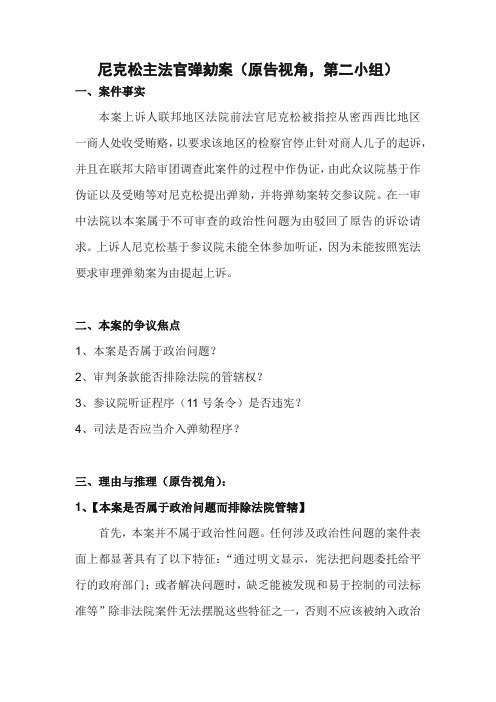
尼克松主法官弹劾案(原告视角,第二小组)一、案件事实本案上诉人联邦地区法院前法官尼克松被指控从密西西比地区一商人处收受贿赂,以要求该地区的检察官停止针对商人儿子的起诉,并且在联邦大陪审团调查此案件的过程中作伪证,由此众议院基于作伪证以及受贿等对尼克松提出弹劾,并将弹劾案转交参议院。
在一审中法院以本案属于不可审查的政治性问题为由驳回了原告的诉讼请求。
上诉人尼克松基于参议院未能全体参加听证,因为未能按照宪法要求审理弹劾案为由提起上诉。
二、本案的争议焦点1、本案是否属于政治问题?2、审判条款能否排除法院的管辖权?3、参议院听证程序(11号条令)是否违宪?4、司法是否应当介入弹劾程序?三、理由与推理(原告视角):1、【本案是否属于政治问题而排除法院管辖】首先,本案并不属于政治性问题。
任何涉及政治性问题的案件表面上都显著具有了以下特征:“通过明文显示,宪法把问题委托给平行的政府部门;或者解决问题时,缺乏能被发现和易于控制的司法标准等”除非法院案件无法摆脱这些特征之一,否则不应该被纳入政治性问题的范畴其次,再联系宪法整体结构进行解释,宪法第1条第1款规定所有的立法权被授予国会。
这里的所有和全权意思相近,但从来没人把它解释为排除法院对立法的合宪性审查。
这就表明宪法第1条第3款赋予参议院具有全权审理弹劾权限中的“全权”只是表面了参众两院的不同分工,由参议院负责审理弹劾,不受众议院干涉,而不是指排除法院审查,这种标准显然可以成为法院审理的标准,从而排除了其政治性,而非排除了法院的管辖权。
2、【参议院第11号条令违宪】根据美国宪法第一条第三款规定,“所有弹劾案,只有参议院有权审理。
在开庭审理弹劾案时,参议员们均应宣誓或作代誓之宣言...在未得出席的参议员的2/3的同意时,任何人不得被判有罪。
”在该条中,“只有”这个词,即表明了参议院的“审理”权,而参议院应当指代的是有100议员的参议院整体,而不是个别、部分的参议员,故参议院按宪法要求“审理”弹劾案件时,应当让所有参议员们均参加并宣誓(或作代誓之宣言),而本案中,参议院“审理“时,并未让所有成员参加听证会,因而其听证会程序违反了宪法要求。
【案例十】合众国诉尼克松案
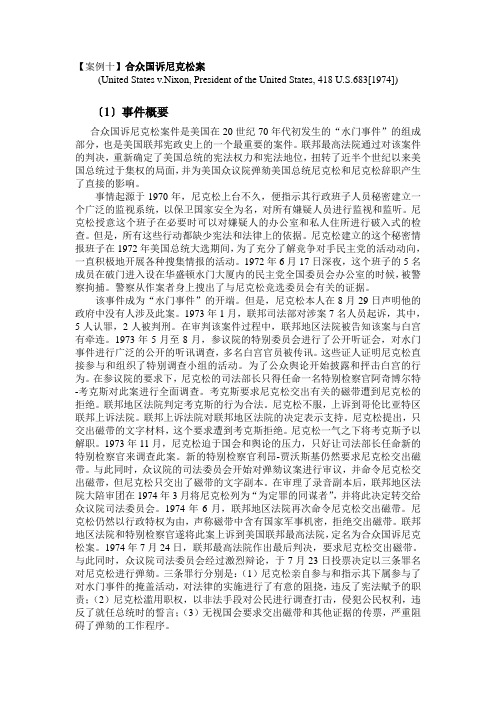
【案例十】合众国诉尼克松案(United States v.Nixon, President of the United States, 418 U.S.683[1974])〔1〕事件概要合众国诉尼克松案件是美国在20世纪70年代初发生的“水门事件”的组成部分,也是美国联邦宪政史上的一个最重要的案件。
联邦最高法院通过对该案件的判决,重新确定了美国总统的宪法权力和宪法地位,扭转了近半个世纪以来美国总统过于集权的局面,并为美国众议院弹劾美国总统尼克松和尼克松辞职产生了直接的影响。
事情起源于1970年,尼克松上台不久,便指示其行政班子人员秘密建立一个广泛的监视系统,以保卫国家安全为名,对所有嫌疑人员进行监视和监听。
尼克松授意这个班子在必要时可以对嫌疑人的办公室和私人住所进行破入式的检查。
但是,所有这些行动都缺少宪法和法律上的依据。
尼克松建立的这个秘密情报班子在1972年美国总统大选期间,为了充分了解竞争对手民主党的活动动向,一直积极地开展各种搜集情报的活动。
1972年6月17日深夜,这个班子的5名成员在破门进入设在华盛顿水门大厦内的民主党全国委员会办公室的时候,被警察拘捕。
警察从作案者身上搜出了与尼克松竞选委员会有关的证据。
该事件成为“水门事件”的开端。
但是,尼克松本人在8月29日声明他的政府中没有人涉及此案。
1973年1月,联邦司法部对涉案7名人员起诉,其中,5人认罪,2人被判刑。
在审判该案件过程中,联邦地区法院被告知该案与白宫有牵连。
1973年5月至8月,参议院的特别委员会进行了公开听证会,对水门事件进行广泛的公开的听讯调查,多名白宫官员被传讯。
这些证人证明尼克松直接参与和组织了特别调查小组的活动。
为了公众舆论开始披露和抨击白宫的行为。
在参议院的要求下,尼克松的司法部长只得任命一名特别检察官阿奇博尔特-考克斯对此案进行全面调查。
考克斯要求尼克松交出有关的磁带遭到尼克松的拒绝。
联邦地区法院判定考克斯的行为合法。
美国诉尼克松案基本案情

美国诉尼克松案基本案情在1972年的总统⼤选中,为了取得民主党内部竞选策略的情报,1972年6⽉17⽇,以美国共和党尼克松竞选班⼦的⾸席安全问题顾问詹姆斯•麦科德(James W. McCord, Jr.)为⾸的5⼈闯⼊位于华盛顿⽔门⼤厦的民主党全国委员会办公室,在安装窃听器并偷拍有关⽂件时,当场被捕。
事件发⽣后尼克松曾⼀度竭⼒掩盖开脱,但在随后对这⼀案件的继续调查中,尼克松政府⾥的许多⼈被陆续揭发出来,并直接涉及到尼克松本⼈,从⽽引发了严重的宪法危机。
这就是“⽔门事件”。
1973年10⽉特别检察官考克斯对总统尼克松的调查进⼊关键时刻,前者要求尼克松交出与⽔门事件有关的证据。
10⽉20⽇,周六,晚。
尼克松下令,要求司法部长理查德森罢免考克斯的职务。
但理查德森拒绝了总统的要求。
随即辞职。
司法部副部长拉克尔•肖斯接任司法部长后,也因拒绝罢免特别检察官⽽辞职。
最后司法部的三号⼈物博克成为司法部代理部长,才答应罢免特别检察官。
尼克松更动员FBI封锁特别检察官及司法长官、次长的办公室,宣布废除特别联邦检察局,把此案的调查权移回司法部。
⾯对尼克松滥⽤⾏政权⼒来维护⾃⼰,招来国民严重指责。
1973年10⽉31⽇,美国众议院决定由该院司法委员会负责调查、搜集尼克松的罪证,为弹劾尼克松作准备。
1974年6⽉25⽇,司法委员会决定公布与弹劾尼克松有关的全部证据。
7⽉底,司法委员会陆续通过了三项弹劾尼克松的条款。
尼克松于8⽉8⽇11点35分致信国务卿基⾟格宣布将于次⽇辞职,从⽽成为美国历史上⾸位辞职的总统。
1974年8⽉9⽇尼克松总统宣布辞职。
从1972年6⽉17⽇詹姆斯•麦科德等5⼈闯⼊位于⽔门⼤厦的民主党全国总部开始,⼀直到1974年8⽉9⽇尼克松总统辞职,《华盛顿邮报》的两位记者鲍勃•伍德沃德(Bob Woodward)和卡尔•伯恩斯坦(Carl Bernstein)对整个事件进⾏了⼀系列的跟踪报道,正是由于他们报道的内幕消息揭露了⽩宫与⽔门事件之间的联系,从⽽最终促使了尼克松的辞职。
水门案件法律思考(3篇)

第1篇一、引言水门事件是美国历史上最严重的政治丑闻之一,发生在1972年。
该事件揭露了美国共和党在总统选举期间非法闯入民主党全国委员会总部,并试图窃取文件。
水门事件最终导致了美国总统理查德·尼克松的辞职,对美国政治和法律制度产生了深远的影响。
本文将从法律角度对水门事件进行思考,探讨事件中涉及的法律问题及其对现代法治的启示。
二、水门事件中的法律问题1. 侵犯隐私权水门事件中,共和党人非法闯入民主党总部,并试图窃取文件。
这一行为侵犯了民主党的隐私权。
根据美国宪法第四修正案,公民有权免受无理搜查和扣押。
水门事件中的非法闯入行为违反了这一原则,侵犯了民主党的隐私权。
2. 侵犯财产权水门事件中,共和党人试图窃取民主党文件,侵犯了民主党的财产权。
美国宪法第五修正案规定,未经正当法律程序,不得剥夺任何人的生命、自由或财产。
共和党人的行为违反了这一规定,侵犯了民主党的财产权。
3. 腐败与权力滥用水门事件中,共和党人为了达到政治目的,不惜采取非法手段,暴露了腐败和权力滥用的严重问题。
美国宪法第三条明确规定,任何公职人员都不得接受外国政府或其代表的贿赂。
水门事件中的共和党人涉嫌接受外国政府的贿赂,违反了这一规定。
4. 刑事责任水门事件中,涉及的人员被追究刑事责任。
美国法律规定,任何人犯有非法侵入、窃取文件等罪行,都将受到法律的严惩。
水门事件中的涉案人员被追究刑事责任,体现了法律的严肃性和公正性。
三、水门事件对现代法治的启示1. 保障公民权利水门事件提醒我们,要始终保障公民的隐私权、财产权等基本权利。
在行使权力过程中,必须严格遵守法律规定,尊重公民权利。
2. 防止权力滥用水门事件暴露了权力滥用的严重问题。
为了防止权力滥用,必须加强对权力的监督和制约,确保权力在阳光下运行。
3. 严格依法治国水门事件表明,法治是国家治理的基本原则。
只有严格依法治国,才能维护国家稳定、社会和谐。
4. 加强司法独立水门事件中,司法部门对涉案人员进行调查和审判,体现了司法独立的重要性。
尼克松总统事件的职业伦理分析

尼克松总统事件的职业伦理分析在XXX国200多年历史上的40任总统中,只有一位总统任期未满却被迫辞职。
这就是第37任总统XXX。
XXX辞职的直接原因是发生在1972年的XXX事件,而更深刻的原因是这个事件背后复杂的党派斗争。
1972后6月12日,一位名叫XXX的安全员在XXX特区XXX大楼发现一个门把上有段磁带。
他叫来了警察,他们当场抓获了5名在XXX总统竞选委员会工作的雇员,5人中1人自称是XXX情报局的雇员,有3人原籍XXX,他们正在XXX党总部搞窃听活动。
这就是XXX国轰动一时的XXX事件。
XXX事件在XXX国被有些人称为一件“奇闻”。
其实事件本身并不足为奇,在XXX国资产阶级共和党和民主覚的两党政治斗争中,什么手段都使用过,窃听算不了什么大事。
当时,XXX国新闻界也未大肆宣扬,只是做了一般报道,窃听专家们向《XXX邮报》说,这种事在过去历届选举中并不少见,同一政党的候选人互相窃听更是常事。
政治党派的权力角逐对XXX事件的发展起了推波助澜的作用。
XXX事件发生时,正值两党竞选总统进人高潮,民主党必然要以此大做文章。
6月20日《XXX邮报》头版以醒冃标题报道说:XXX顾问与窃听人物有关连。
文章说,报据“与调查此案关系密切的联邦官员”提供的消息,在民主党总部内逮住的人有两个人的通讯录上发现有XXX的名字。
XXX是中央情报局前特工人员,1972年3月以前一直在XXX工作,充当XXX的顾问。
这使XXX吃惊不小,他认为:像XXX这样的前XXX低级职员受到牵连无足轻重,问题是XXX 是他的助手和顾问,一旦被卷入后果就严重了。
民主党人据此开始发动攻势。
民主党全国委员会对争取总统连任委员会提出诉论,控告其盗窃他人秘密,违反民权,要求赔偿100万XXX元。
这一讼案可以传讯争取总统连任委员会和XXX的几乎全部入员出庭,对此,《时代》周刊评论道,民主党起诉的真正意图是“要在整个秋季使共和党人忙于应付法院,使案件为公众所瞩目,以破坏看来势不可挡的共和党竞选活动”。
比较经典的法律案例(3篇)

第1篇一、引言法律案例是法律实践中发生的具有典型意义的事件,通过对经典法律案例的研究,可以深入了解法律的发展历程、法律原则和司法实践。
本文将比较分析美国诉尼克松案与刘少奇案,探讨两案在历史背景、法律原则、司法实践等方面的异同。
二、美国诉尼克松案1. 历史背景1972年,美国水门事件爆发,尼克松总统涉嫌非法闯入民主党全国总部,窃取政治情报。
随后,美国国会展开调查,并要求尼克松交出相关录音带。
尼克松拒绝交出,导致美国司法部起诉他。
2. 法律原则美国诉尼克松案主要涉及以下几个法律原则:(1)行政权力与司法权力的分立:美国宪法规定,行政权力和司法权力相互独立,相互制约。
在此案中,法院判决尼克松必须交出录音带,体现了司法权力对行政权力的制约。
(2)证据规则:美国法律规定,被告有义务提供证据以证明自己的清白。
在此案中,法院判决尼克松必须交出录音带,以证明他没有违法行为。
(3)总统特权:美国总统享有一定的行政特权,但并非不受限制。
在此案中,法院认为尼克松的总统特权不能用来掩盖违法行为。
3. 司法实践美国诉尼克松案中,最高法院判决尼克松必须交出录音带,并公开审判。
这一判决体现了美国司法制度的独立性,以及对总统权力的制约。
三、刘少奇案1. 历史背景1966年至1976年,我国发生“文化大革命”。
在此期间,刘少奇被错误地指控为“叛徒、内奸、工贼”,被迫害致死。
1980年,中共中央决定为刘少奇平反,恢复其名誉。
2. 法律原则刘少奇案主要涉及以下几个法律原则:(1)法律面前人人平等:我国宪法规定,公民在法律面前一律平等。
在此案中,刘少奇作为国家领导人,也受到法律的制裁,体现了法律面前人人平等的原则。
(2)依法治国:我国宪法规定,国家实行依法治国。
在此案中,对刘少奇案件的平反,体现了我国依法治国的原则。
(3)司法公正:我国宪法规定,人民法院依照法律规定独立行使审判权。
在此案中,刘少奇案件经过重新审理,体现了司法公正的原则。
美国联邦最高法院的权力平衡功能分析——以美国尼克松案为例

美国联邦最高法院的权力平衡功能分析——以美国尼克松案为例李岭梅【摘要】美国是典型的实行三权分立制度的国家,总统与国会相互独立且相互制衡。
具有国家权力平衡功能的联邦最高法院居于其中,对二者关系进行调节。
凡是越过自身权力界限侵犯另一方的权力,就要被联邦最高法院制止,从而保证国家机关依法定的权力界限行事。
美国诉尼克松案就是阐释联邦最高法院的权力平衡功能的最佳案例。
%The United States is a typical nation which implements the separation of powers.President and Congress are independent of each other,each of them serves as checks and balances to each other.The Federal Supreme Court,with the function of balancing the statepower,adjusts the relationship between them.Once they overstep their authorities and infringe upon the power of the other,the Federal Supreme Court will bring an end to that,ensuring that they act within the competence of their own.The United States v.Nixon case is the best one to illustrate the function of the Federal Supreme Court to balance the state power.【期刊名称】《郑州航空工业管理学院学报(社会科学版)》【年(卷),期】2012(031)002【总页数】4页(P98-100,166)【关键词】美国诉尼克松案;联邦最高法院;权力平衡功能【作者】李岭梅【作者单位】河南检察职业学院,河南郑州450000【正文语种】中文【中图分类】D971.2水门事件引发的美国诉尼克松案是美国宪政史上一个里程碑式的案件。
中西方法律案例分析(3篇)

第1篇一、引言法律作为维护社会秩序、保障公民权益的重要工具,在不同的国家和地区有着不同的表现形式和实施方式。
本文将以美国诉尼克松案和中国行政诉讼案为例,分析中西方法律案例的特点和差异,旨在为理解不同法律体系提供参考。
二、美国诉尼克松案1. 案件背景1972年,美国总统理查德·尼克松的水门事件爆发,尼克松政府被指控非法侵入民主党全国委员会总部。
在调查过程中,尼克松政府拒绝交出相关录音带,引发了美国国会与尼克松政府之间的激烈对抗。
2. 案件审理1974年,美国最高法院受理了此案。
在审理过程中,法院要求尼克松政府交出相关录音带,但尼克松政府以总统特权为由拒绝。
最高法院最终裁定,尼克松政府必须交出录音带,否则将面临藐视法庭的指控。
3. 案件影响美国诉尼克松案成为美国宪法史上具有重要意义的案例,标志着司法审查权的确立。
该案表明,即使在总统特权的情况下,法院仍可对政府行为进行审查,保障了公民的合法权益。
三、中国行政诉讼案1. 案件背景2015年,中国某市居民李某因不满当地政府征收其土地而提起行政诉讼。
在审理过程中,法院要求政府提供征收土地的相关文件,但政府以保密为由拒绝。
2. 案件审理2016年,中国最高人民法院受理了此案。
在审理过程中,法院认为政府拒绝提供相关文件侵犯了李某的知情权。
最终,法院判决政府败诉,并要求其公开征收土地的相关文件。
3. 案件影响中国行政诉讼案体现了中国司法制度在保障公民权益方面的进步。
该案表明,在中国,公民可通过行政诉讼途径维护自己的合法权益,法院对政府行为进行审查,有利于促进政府依法行政。
四、中西方法律案例分析1. 案例特点(1)美国诉尼克松案:此案体现了美国司法审查权的确立,强调了法院对政府行为的监督和制约作用。
在美国,法院具有独立的地位,可以对政府行为进行审查,保障公民的合法权益。
(2)中国行政诉讼案:此案体现了中国行政诉讼制度的完善,强调了法院在维护公民权益方面的作用。
从“合众国诉尼克松案”看司法审查制度(PowerPoint 51页)
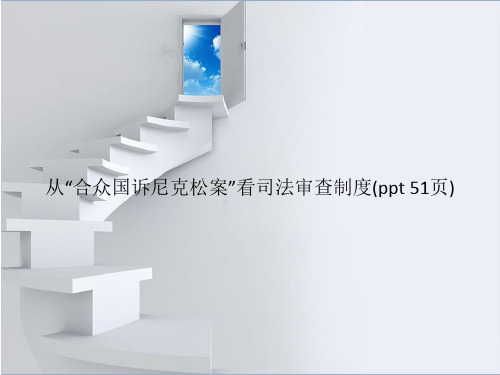
“合众国诉尼克松”案所体现的司法审查活动的 制衡作用
在该案中,由于联邦最高法院的司法审查活动, 确定了总统行政特权的合宪性,解决了行政权与 刑事审判调查权之间的矛盾和冲突。最高法院通 过其不受干扰的司法审查活动,使国家权力分配 得以界定和平衡。
“合众国诉尼克松”案所体现的 司法审查活动的制衡作用
这个宪法危机把美国人从面对一个抽象的理念, 逼到一个实实在在的问题面前:如果总统成功地 把握宪法解释大权,哪怕是一个民选的总统,也 不能保证不走向危险的方向。从尼克松那里,美 国人才真切地感觉到,建国之父们对于“权力是 私欲和犯罪的酵母”这样的顾虑并非没有道理。 尤且在美国,已拥有很大权力的总统,一旦再掌 握了宪法含义的裁决权,则宪政体制的平衡作用 就会被打破,那么专制就不再是一个古老的神话, 也不再是遥远的他国里的故事了。
同样,国会(代议机关)也不是宪法解释的合适 机关。这取决于宪政制度之下的两个政治理念: 对立法机关不抱绝对信任的政治理念,以及在多 数决定原则下保护少数的政治理念。在共和政体 中,立法机关由于是人民直接选举的,容易以人 民自居,把自己当作其他部门的上司,其他部门 要维持所指望的宪法规定的平衡,就会极其困难。 此外,在民主制度下,立法机关代表的选举、法 律的制定、国家秩序的创造,原则上采用多数者 统治或者多数者决定,即以过半数的意志为全体 的共同意志进行统治的方法。从这个意义上讲, 民主政治又可以说是多数决定主义或多数决定政 治。
这是一个历史性的意见——最高法院的判决书说:司 法机关有合法权力判定政府关于自己行政特权主张的 是非,因为被要求的录音带直接与所进行的刑事案件 有关,所以总统关于保密上的一般权力应服从在公平 的刑事案件中法律的正当程序的基本要求。 这一判
决及随后交出的有关“水门事件”的录音带是导致尼 克松总统(此时,尼克松已通过竞选取得连任)辞职 的主要原因。《纽约时报》记者报道说:“尼克松为 争取留任的战斗的失败,乃是尼克松法院裁决的结 果。”
水门案件法律思考(3篇)

第1篇一、引言1972年6月17日,美国华盛顿水门大厦发生一起窃听丑闻,此事件最终导致美国总统尼克松辞职,成为美国历史上最著名的政治丑闻之一。
水门案件不仅揭示了政治权力的腐败,也引发了人们对法律、民主和司法公正的深刻思考。
本文将从法律的角度对水门案件进行深入分析,探讨其背后的法律问题及其对当代社会的启示。
二、水门案件的法律问题1. 侵犯隐私权水门案件中,犯罪分子非法潜入水门大厦,窃取民主党全国委员会的文件,严重侵犯了民主党成员的隐私权。
在我国,隐私权是公民的一项基本权利,受到法律的保护。
根据《中华人民共和国宪法》和《中华人民共和国民法典》,公民的隐私权不受非法侵犯。
2. 侵犯财产权犯罪分子在水门大厦窃取的民主党文件,属于民主党财产。
犯罪分子非法占有这些文件,侵犯了民主党的财产权。
在我国,财产权是公民的一项基本权利,受到法律的保护。
根据《中华人民共和国宪法》和《中华人民共和国民法典》,公民的财产权不受非法侵犯。
3. 违反国家安全法水门案件中,犯罪分子非法潜入水门大厦,窃取民主党文件,严重危害了国家安全。
在我国,国家安全法明确规定,任何组织和个人不得从事危害国家安全的活动。
犯罪分子的行为违反了国家安全法。
4. 侵犯民主选举权水门案件中,犯罪分子非法窃取民主党文件,企图干扰民主党全国委员会的选举。
在我国,民主选举权是公民的一项基本权利,受到法律的保护。
根据《中华人民共和国宪法》和《中华人民共和国选举法》,公民有权参加选举,任何组织和个人不得非法干预。
5. 诽谤罪在案件调查过程中,尼克松政府试图掩盖真相,散布虚假信息,诽谤涉案人员。
在我国,诽谤罪是侵犯他人名誉权的犯罪行为,受到法律制裁。
1. 强化法治意识水门案件的发生,暴露了尼克松政府法治意识的淡薄。
在我国,法治是国家治理的基本方式,公民应当树立法治意识,自觉遵守法律法规。
2. 完善法律制度水门案件揭示了我国法律制度在反间谍、反腐败等方面的不足。
因此,我国应当不断完善法律制度,加强法律法规的制定和实施,提高法律的威慑力。
美国诉尼克松案

(New York Times Co. v. United Stat es,1971) 在结束越战问题上,尼克松扮演了一个 难度极大的角色
两项影响深远的措施
一项是向“沉默的大多数”
(Silent Majority)直接呼吁; 另一项是下令建立白宫的反间谍班子 ─“管子工”(Plumbers)。 “管子工”成立后,大肆调查涉嫌泄密 者的各种线索,肆无忌惮,不择手段。 "管子工"于1971年底宣告解散,其部份 成员转到尼克松的竞选班子当差。
美国宪政体制的特点
中央情报局和联邦调查局——总统、国
会和联邦法院 1947年《国家安全法》,国会严禁中央 情报局进行国内情报活动和干涉国内事 务。而联邦调查局的行动必须遵循联邦 法律的程序。
白宫幕僚班子
负责搜集民主党对手情报和实施特种行动
窃听民主党人电话,偷拍秘密文件; 雇佣妓女勾引民主党竞选班子成员和总统候选 人,用隐藏的摄像机偷拍淫秽场面,以此讹诈 对手和换取情报; 打击那些在幕后组织示威、破坏共和党全国代 表大会的民主党人士,把这些危险人物秘密绑 架到拉丁美洲国家。
白宫班子(The White House Staff)
白宫办公厅、国家安全委员会、行政管
理和预算局、经济顾问委员会、政策发 展办公室等部门组成 由总统自行任命,受总统直接领导,无 需参议院同意和批准
3000余人,忠诚>经验
严重侵犯了传统上属于行政部门的职权
白宫幕僚的弊端
首先,使国会对行政部门的监督失去意
——"美国诉尼克松案"
"此案提出了一个真正的宪法问题,即
究竟谁是解释宪法含义的仲裁人?", "…如果现任总统或任何一位总统声称, 宪法的含义是由总统说了算,那么这个 国家的立宪政府体制就会处于严重的危 险之中。" 法官——伯格(首席大法官)、布伦南、 道格拉斯:统一口径
美国诉尼克松案UNITEDSTATESV.NIXON(1974)

美国诉尼克松案UNITEDSTATESV.NIXON(1974)美国诉尼克松案 (UNITED STATES V. NIXON (1974))于1972年11月,理察尼克松(Richard Nixon)总统决定性地打败了民主党候选人乔治麦戈文(George McGovern),获选连任。
但接近竞选活动尾声时,一群抢匪打劫民主党于华盛顿水门(Watergate complex)的竞选总部。
多亏于华盛顿邮报决定性的调查,原为一件小新闻的事件,因为新闻记者揭露可追踪至高层政府官员的轨迹,而迅速扩张。
尼克松政府否认做错任何事但很快的可以明显看出,他在试着遮掩强劫事件,以及尼克松政府与劫案之间的关联,此关联甚至可能包括总统。
于国会与公众压力下,尼克松指派了一个特别检察官。
当获知总统曾于椭圆形办公室秘密录下对谈时,检察官发了一张传票以获取他相信对犯罪调查相关的录音带。
于1974年3月,联邦大陪审团以阴谋阻碍正义以及其它与水门劫案相关的罪行,来裁决尼克松总统7个助理。
而总统本被称为未起诉之共谋者。
基于特别检察官之行动,地方法院发出传票给总统,要求他拿出总统与其它人之间特定的会议相关的某些录音带与文件。
虽然尼克松总统公开了一些被传的对话中经过剪辑的纪录,他的顾问提出「特别出现」,并以行政特权申请对传票的彻销。
当地方法院拒绝该申请,总统提出上诉,而该案迅速地转至最高法院。
下面是法院无计名意见的一部分,于其中最高法院处理两项关键议题,司法为宪法最终仲裁者的力量,以及总统之宣称,以行政特权之名,他可以选择保留与犯罪调查相关的物证。
首席大法官伯格(Chief Justice Burger)重新确认马伯瑞诉麦迪逊案(Marbury v. Madison)与库珀诉阿伦案(Cooper v. Aaron)的裁决,于宪法之下,法院于决定宪法问题具最终裁判权,而没有人,即使他是美国总统,是在法律之上的。
虽然对尼克松是否会遵守法院裁决持有怀疑,但在决定传下来的8小时之内,白宫宣布他会遵从裁决。
外国法律案例中英文对照(2篇)
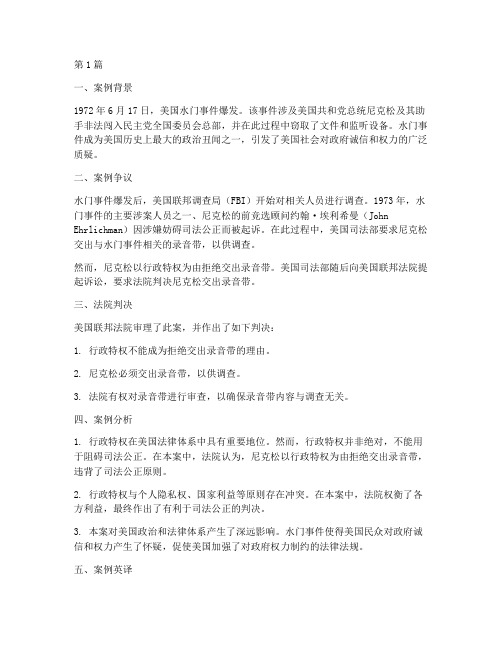
第1篇一、案例背景1972年6月17日,美国水门事件爆发。
该事件涉及美国共和党总统尼克松及其助手非法闯入民主党全国委员会总部,并在此过程中窃取了文件和监听设备。
水门事件成为美国历史上最大的政治丑闻之一,引发了美国社会对政府诚信和权力的广泛质疑。
二、案例争议水门事件爆发后,美国联邦调查局(FBI)开始对相关人员进行调查。
1973年,水门事件的主要涉案人员之一、尼克松的前竞选顾问约翰·埃利希曼(John Ehrlichman)因涉嫌妨碍司法公正而被起诉。
在此过程中,美国司法部要求尼克松交出与水门事件相关的录音带,以供调查。
然而,尼克松以行政特权为由拒绝交出录音带。
美国司法部随后向美国联邦法院提起诉讼,要求法院判决尼克松交出录音带。
三、法院判决美国联邦法院审理了此案,并作出了如下判决:1. 行政特权不能成为拒绝交出录音带的理由。
2. 尼克松必须交出录音带,以供调查。
3. 法院有权对录音带进行审查,以确保录音带内容与调查无关。
四、案例分析1. 行政特权在美国法律体系中具有重要地位。
然而,行政特权并非绝对,不能用于阻碍司法公正。
在本案中,法院认为,尼克松以行政特权为由拒绝交出录音带,违背了司法公正原则。
2. 行政特权与个人隐私权、国家利益等原则存在冲突。
在本案中,法院权衡了各方利益,最终作出了有利于司法公正的判决。
3. 本案对美国政治和法律体系产生了深远影响。
水门事件使得美国民众对政府诚信和权力产生了怀疑,促使美国加强了对政府权力制约的法律法规。
五、案例英译Case Name: United States v. NixonI. BackgroundOn June 17, 1972, the Watergate Scandal broke out in the United States. The scandal involved the illegal break-in of the Democratic National Committee headquarters by the Republican Party, led by President Richard Nixon and his assistants, during which files and listening equipment were stolen. The Watergate Scandal became one of the biggest political scandals in American history and sparked widespread public concern about government integrity and power.II. ControversyAfter the Watergate Scandal broke out, the Federal Bureau ofInvestigation (FBI) began to investigate the relevant personnel. In 1973, one of the main suspects in the Watergate Scandal, John Ehrlichman,Nixon's former campaign advisor, was indicted on charges of obstructing justice. During this process, the U.S. Department of Justice requested that Nixon hand over the tape recordings related to the Watergate Scandal for investigation.However, Nixon refused to hand over the tape recordings on the groundsof executive privilege. The U.S. Department of Justice then filed a lawsuit in the U.S. federal court, seeking a judgment that Nixon must hand over the tape recordings.III. Court DecisionThe U.S. federal court heard the case and made the following decisions:1. Executive privilege cannot be used as a reason to refuse to hand over the tape recordings.2. Nixon must hand over the tape recordings for investigation.3. The court has the right to review the tape recordings to ensure that the content is unrelated to the investigation.IV. Case Analysis1. Executive privilege plays an important role in the American legal system. However, executive privilege is not absolute and cannot be used to obstruct justice. In this case, the court held that Nixon's refusalto hand over the tape recordings on the grounds of executive privilege violated the principle of judicial fairness.2. Executive privilege is in conflict with principles such as personal privacy and national interests. In this case, the court weighed the interests of all parties and ultimately made a judgment in favor of judicial fairness.3. This case had a profound impact on the American political and legal system. The Watergate Scandal led the American public to question the integrity and power of the government, prompting the United States to strengthen laws and regulations on the restriction of government power.V. English TranslationI. BackgroundOn June 17, 1972, the Watergate Scandal broke out in the United States. The scandal involved the illegal break-in of the Democratic National Committee headquarters by the Republican Party, led by President Richard Nixon and his assistants, during which files and listening equipment were stolen. The Watergate Scandal became one of the biggest political scandals in American history and sparked widespread public concern about government integrity and power.II. ControversyAfter the Watergate Scandal broke out, the Federal Bureau ofInvestigation (FBI) began to investigate the relevant personnel. In 1973, one of the main suspects in the Watergate Scandal, John Ehrlichman,Nixon's former campaign advisor, was indicted on charges of obstructing justice. During this process, the U.S. Department of Justice requested that Nixon hand over the tape recordings related to the Watergate Scandal for investigation.However, Nixon refused to hand over the tape recordings on the grounds of executive privilege. The U.S. Department of Justice then filed a lawsuit in the U.S. federal court, seeking a judgment that Nixon must hand over the tape recordings.III. Court DecisionThe U.S. federal court heard the case and made the following decisions:1. Executive privilege cannot be used as a reason to refuse to hand over the tape recordings.2. Nixon must hand over the tape recordings for investigation.3. The court has the right to review the tape recordings to ensure that the content is unrelated to the investigation.IV. Case Analysis1. Executive privilege plays an important role in the American legal system. However, executive privilege is not absolute and cannot be used to obstruct justice. In this case, the court held that Nixon's refusal to hand over the tape recordings on the grounds of executive privilege violated the principle of judicial fairness.2. Executive privilege is in conflict with principles such as personal privacy and national interests. In this case, the court weighed the interests of all parties and ultimately made a judgment in favor of judicial fairness.3. This case had a profound impact on the American political and legal system. The Watergate Scandal led the American public to question the integrity and power of the government, prompting the United States to strengthen laws and regulations on the restriction of government power.V. English TranslationI. BackgroundOn June 17, 1972, the Watergate Scandal broke out in the United States. The scandal involved the illegal break-in of the Democratic NationalCommittee headquarters by the Republican Party, led by President Richard Nixon and his assistants, during which files and listening equipment were stolen. The Watergate Scandal became one of the biggest political scandals in American history and sparked widespread public concern about government integrity and power.II. ControversyAfter the Watergate Scandal broke out, the Federal Bureau ofInvestigation (FBI) began to investigate the relevant personnel. In 1973, one of the main suspects in the Watergate Scandal, John Ehrlichman,Nixon's former campaign advisor, was indicted on charges of obstructing justice. During this process, the U.S. Department of Justice requested that Nixon hand over the tape recordings related to the Watergate Scandal for investigation.However, Nixon refused to hand over the tape recordings on the groundsof executive privilege. The U.S. Department of Justice then filed a lawsuit in the U.S. federal court, seeking a judgment that Nixon must hand over the tape recordings.III. Court DecisionThe U.S. federal court heard the case and made the following decisions:1. Executive privilege cannot be used as a reason to refuse to hand over the tape recordings.2. Nixon must hand over the tape recordings for investigation.3. The court has the right to review the tape recordings to ensure that the content is unrelated to the investigation.IV. Case Analysis1. Executive privilege plays an important role in the American legal system. However, executive privilege is not absolute and cannot be used to obstruct justice. In this case, the court held that Nixon's refusalto hand over the tape recordings on the grounds of executive privilege violated the principle of judicial fairness.2. Executive privilege is in conflict with principles such as personal privacy and national interests. In this case, the court weighed the interests of all parties and ultimately made a judgment in favor of judicial fairness.3. This case had a profound impact on the American political and legal system. The Watergate Scandal led the American public to question the integrity and power of the government, prompting the United States to strengthen laws and regulations on the restriction of government power.V. English TranslationI. BackgroundOn June 17, 1972, the Watergate Scandal broke out in the United States. The scandal involved the illegal break-in of the Democratic National Committee headquarters by the Republican Party, led by President Richard Nixon and his assistants, during which files and listening equipment were stolen. The Watergate Scandal became one of the biggest political scandals in American history and sparked widespread public concern about government integrity and power.II. ControversyAfter the Watergate Scandal broke out, the Federal Bureau ofInvestigation (FBI) began to investigate the relevant personnel. In 1973, one of the main suspects in the Watergate Scandal, John Ehrlichman,Nixon's former campaign advisor, was indicted on charges of obstructing justice. During this process, the U.S. Department of Justice requested that Nixon hand over the tape recordings related to the Watergate Scandal for investigation.However, Nixon refused to hand over the tape recordings on the groundsof executive privilege. The U.S. Department of Justice then filed a lawsuit in the U.S. federal court, seeking a judgment that Nixon must hand over the tape recordings.III. Court DecisionThe U.S. federal court heard the case and made the following decisions:1. Executive privilege cannot be used as a reason to refuse to hand over the tape recordings.2. Nixon must hand over the tape recordings for investigation.3. The court has the right to review the tape recordings to ensure that the content is unrelated to the investigation.IV. Case Analysis1. Executive privilege plays an important role in the American legal system. However, executive privilege is not absolute and cannot be used to obstruct justice. In this case, the court held that Nixon's refusal to hand over the tape recordings on the grounds of executive privilege violated the principle of judicial fairness.2. Executive privilege is in conflict with principles such as personal privacy and national interests. In this case, the court weighed the interests of all parties and ultimately made a judgment in favor of judicial fairness.3. This case had a profound impact on the American political and legal system. The Watergate Scandal led the American public to question the integrity and power of the government, prompting the United States to strengthen laws and regulations on the restriction of government power.V. English TranslationI. BackgroundOn June 17, 1972, the Watergate Scandal broke out in the United States. The scandal involved the illegal break-in of the Democratic National Committee headquarters by the Republican Party, led by President Richard Nixon and his assistants, during which files and listening equipment were stolen. The Watergate Scandal became one of the biggest political scandals in American history and sparked widespread public concern about government integrity and power.II. ControversyAfter the Watergate Scandal broke out, the Federal Bureau ofInvestigation (FBI) began to investigate the relevant personnel. In 1973, one of the main suspects in the Watergate Scandal, John Ehrlichman,Nixon's former campaign advisor, was indicted on charges of obstructing justice. During this process, the U.S. Department of Justice requested that Nixon hand over the tape recordings related to the Watergate Scandal for investigation.However, Nixon refused to hand over the tape recordings on the groundsof executive privilege. The U.S. Department of Justice then filed a lawsuit in the U.S. federal court, seeking a judgment that Nixon must hand over the tape recordings.III. Court DecisionThe U.S. federal court heard the case and made the following decisions:1. Executive privilege cannot be used as a reason to refuse to hand over the tape recordings.2. Nixon must hand over the tape recordings for investigation.3. The court has the right to review the tape recordings to ensure that the content is unrelated to the investigation.IV. Case Analysis1. Executive privilege plays an important role in the American legal system. However, executive privilege is not absolute and cannot be used to obstruct justice. In this case, the court held that Nixon's refusalto hand over the tape recordings on the grounds of executive privilege violated the principle of judicial fairness.2. Executive privilege is in conflict with principles such as personal privacy and national interests. In this case, the court weighed the interests of all parties and ultimately made a judgment in favor of judicial fairness.3. This case had a profound impact on the American political and legal system. The Watergate Scandal led the American public to question theintegrity and power of the government, prompting the United States to strengthen laws and regulations on the restriction of government power.V. English TranslationI. BackgroundOn June 17, 1972, the Watergate Scandal broke out in the United States. The scandal involved the illegal break-in of the Democratic National Committee headquarters by the Republican Party, led by President Richard Nixon and his assistants, during which files and listening equipment were stolen. The Watergate Scandal became one of the biggest political scandals in American history and sparked widespread public concern about government integrity and power.II. ControversyAfter the Watergate Scandal broke out, the Federal Bureau ofInvestigation (FBI) began to investigate the relevant personnel. In 1973, one of the main suspects in the Watergate Scandal, John Ehrlichman,Nixon's former campaign advisor, was indicted on charges of obstructing justice. During this process, the U.S. Department of Justice requested that Nixon hand over the tape recordings related to the Watergate Scandal for investigation.However, Nixon refused to hand over the tape recordings on the groundsof executive privilege. The U.S. Department of Justice then filed a lawsuit in the U.S. federal court, seeking a judgment that Nixon must hand over the tape recordings.III. Court DecisionThe U.S. federal court heard the case and made the following decisions:1. Executive privilege cannot be used as a reason to refuse to hand over the tape recordings.2. Nixon must hand over the tape recordings for investigation.3. The court has the right to review the tape recordings to ensure that the content is unrelated to the investigation.IV. Case Analysis1. Executive privilege plays an important role in the American legal system. However, executive privilege is not absolute and cannot be used to obstruct justice. In this case, the court held that Nixon's refusalto hand over the tape recordings on the grounds of executive privilege violated the principle of judicial fairness.2. Executive privilege is in conflict with principles such as personal privacy and national interests. In this case, the court weighed the interests of all parties and ultimately made a judgment in favor of judicial fairness.3. This case had a profound impact on the American political and legal system. The Watergate Scandal led the American public to question the integrity and power of the government, prompting the United States to strengthen laws and regulations on the restriction of government power.V. English TranslationI. BackgroundOn June 17, 1972, the Watergate Scandal broke out in the United States. The scandal involved the illegal break-in of the Democratic National Committee headquarters by the Republican Party, led by President Richard Nixon and his assistants, during which files and listening equipment were stolen. The Watergate Scandal became one of the biggest political scandals in American history and sparked widespread public concern about government integrity and power.II. ControversyAfter the Watergate Scandal broke out, the Federal Bureau ofInvestigation (FBI) began to investigate the relevant personnel. In 1973, one of the main suspects in the Watergate Scandal, John Ehrlichman,Nixon's former campaign advisor, was indicted on charges of obstructing justice. During this process, the U.S. Department of Justice requested that Nixon hand over the tape recordings related to the Watergate Scandal for investigation.However, Nixon refused to hand over the tape recordings on the grounds of executive privilege. The U.S. Department of Justice then filed a lawsuit in the U.S. federal court, seeking a judgment that Nixon must hand over the tape recordings.III. Court DecisionThe U.S. federal court heard the case and made the following decisions:1. Executive privilege cannot be used as a reason to refuse to hand over the tape recordings.2. Nixon must hand over the tape recordings for investigation.3. The court has the right to review the tape recordings to ensure that the content is unrelated to the investigation.IV. Case Analysis1. Executive privilege plays an important role in the American legal system. However, executive privilege is not absolute and cannot be used to obstruct justice. In this case, the court held that Nixon's refusal to hand over the tape recordings on the grounds of executive privilege violated the principle of judicial fairness.2. Executive privilege is in conflict with principles such as personal privacy and national interests. In this case, the court weighed the interests of all parties and ultimately made a judgment in favor of judicial fairness.3. This case had a profound impact on the American political and legal system. The Watergate Scandal led the American public to question the integrity and power of the government, prompting the United States to strengthen laws and regulations on the restriction of government power.V. English TranslationI. BackgroundOn June 17, 1972, the Watergate Scandal broke out in the United States. The scandal involved the illegal break-in of the Democratic NationalCommittee headquarters by the Republican Party, led by President Richard Nixon and his assistants, during which files and listening equipment were stolen. The Watergate Scandal became one of the biggest political scandals in American history and sparked widespread public concern about government integrity and power.II. ControversyAfter the Watergate Scandal broke out, the Federal Bureau ofInvestigation (FBI) began to investigate the relevant personnel. In 1973, one of the main suspects in the Watergate Scandal, John Ehrlichman,Nixon's former campaign advisor, was indicted on charges of obstructing justice. During this process, the U.S. Department of Justice requested that Nixon hand over the tape recordings related to the Watergate Scandal for investigation.However, Nixon refused to hand over the tape recordings on the groundsof executive privilege. The U.S. Department of Justice then filed a lawsuit in the U.S. federal court, seeking a judgment that Nixon must hand over the tape recordings.III. Court DecisionThe U.S. federal court heard the case and made the following decisions:1. Executive privilege cannot be used as a reason to refuse to hand over the tape recordings.2. Nixon must hand over the tape recordings for investigation.3. The court has the right to review the tape recordings to ensure that the content is unrelated to the investigation.IV. Case Analysis1. Executive privilege plays an important role in the American legal system. However, executive privilege is not absolute and cannot be used to obstruct justice. In this case, the court held that Nixon's refusalto hand over the tape recordings on the grounds of executive privilege violated the principle of judicial fairness.2. Executive privilege is in conflict with principles such as personal privacy and national interests. In this case, the court weighed the第2篇Case Summary:In the case of Johnson v. Smith, the plaintiff, Johnson, filed a lawsuit against the defendant, Smith, alleging negligence and breach of contract. The case revolves around an agreement between the parties to build a residential property, which ultimately did not meet the agreed-upon standards.English Text:---Johnson v. SmithCourt of First InstanceCase No. 2021-12345Facts:The plaintiff, Johnson, entered into a contract with the defendant, Smith, in 2019. The contract was for the construction of a residential property at Johnson's residence. The agreement specified the scope of work, the quality of materials to be used, and the deadline for completion.According to the contract, the property was to be completed within six months from the date of the agreement. However, after the deadline, the property was not ready for occupancy. Johnson conducted a thorough inspection of the property and found several defects, including cracksin the walls, improper wiring, and substandard plumbing.Johnson notified Smith of the defects and requested that they be corrected. Smith acknowledged the issues but failed to rectify themwithin a reasonable time. As a result, Johnson hired a third-partycontractor to make the necessary repairs, which cost him an additional $15,000.Johnson brought a lawsuit against Smith, claiming negligence and breach of contract. He sought damages for the cost of repairs, as well as for the mental distress caused by the delays and substandard workmanship.Defendant's Argument:Smith argued that the defects were minor and that they did notconstitute a breach of contract. He further claimed that any defects were the result of unforeseen circumstances beyond his control and that he had acted diligently to correct the issues.Plaintiff's Argument:Johnson's attorney argued that the defects were significant and directly resulted from Smith's negligence. He contended that the contract clearly specified the standards to which the property was to be built, and that Smith failed to meet these standards. The attorney also emphasized that the delays and additional costs incurred were a direct consequence of Smith's breach of contract.Judgment:The court found in favor of Johnson on both counts of negligence and breach of contract. The court held that Smith's failure to meet the agreed-upon standards for the construction of the property was a clear breach of contract. Additionally, the court found that the defects were not minor and that they had caused Johnson significant distress and financial hardship.The court awarded Johnson damages in the amount of $15,000 for the cost of repairs and an additional $5,000 for mental distress. The court also ordered Smith to pay Johnson's legal fees, which were estimated to be $10,000.Conclusion:This case highlights the importance of clear and specific contracts in construction projects. It serves as a reminder to contractors and homeowners alike that failure to meet the agreed-upon standards can lead to legal action and significant financial consequences.---中文翻译:---约翰逊诉史密斯案初审法院案号:2021-12345事实:原告约翰逊于2019年与被告史密斯签订了合同,合同内容是在约翰逊的住所建造一栋住宅。
美国法律判例案件号(3篇)

第1篇一、案件背景1972年6月17日,美国水门事件爆发,五名破坏者被发现在民主党全国委员会总部安装窃听器和破坏装置。
随着调查的深入,发现美国总统理查德·尼克松涉嫌与水门事件有关。
1974年,美国众议院通过了弹劾尼克松的决议,最终导致尼克松于同年8月8日辞职。
此后,美国司法部对尼克松进行了调查,并于1974年4月30日向最高法院提起诉讼,要求尼克松交出与水门事件有关的录音带。
二、案件过程1. 地方法院审理1974年4月30日,美国地方法院法官约翰·J·谢尔曼(John J. Sirica)下令尼克松交出与水门事件有关的录音带。
尼克松辩称,这些录音带属于总统特权,不应交出。
地方法院驳回了尼克松的辩解,并判决尼克松必须在5月31日之前交出录音带。
2. 美国上诉法院审理尼克松不服地方法院的判决,向美国上诉法院提起上诉。
上诉法院于1974年7月8日维持了地方法院的判决,认为总统特权不适用于这些录音带。
3. 美国最高法院审理尼克松再次向美国最高法院提起上诉。
1974年7月24日,最高法院以8比0的投票结果(首席大法官沃伦·伯格因病缺席)裁定尼克松必须交出录音带。
此案成为美国历史上最高法院首次审理涉及总统特权的案件。
三、案件结果美国最高法院的判决对美国法律判例产生了深远的影响。
以下是该案件的主要结果:1. 确立了总统特权原则的适用范围。
最高法院认为,总统特权不适用于那些涉及国家安全、外交政策和总统职权行使的录音带。
然而,对于那些涉及政治调查、司法调查或其他政府机构内部事务的录音带,总统特权并不适用。
2. 强调了司法审查权的独立性。
最高法院的判决表明,司法部门有权对总统的特权进行审查,并确保其不违反宪法和法律规定。
3. 增强了美国民众对政府透明度的信心。
尼克松被迫交出录音带,使得水门事件的真相得以公之于众,提高了美国民众对政府透明度的信心。
四、案件意义1. 美国诉尼克松案是美国宪法史上的一次重要判决,对美国的司法体系产生了深远的影响。
总统干涉法律案例分享会(3篇)
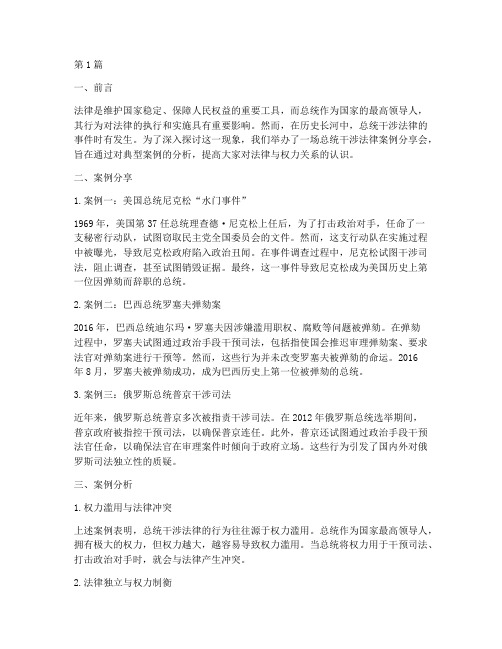
第1篇一、前言法律是维护国家稳定、保障人民权益的重要工具,而总统作为国家的最高领导人,其行为对法律的执行和实施具有重要影响。
然而,在历史长河中,总统干涉法律的事件时有发生。
为了深入探讨这一现象,我们举办了一场总统干涉法律案例分享会,旨在通过对典型案例的分析,提高大家对法律与权力关系的认识。
二、案例分享1.案例一:美国总统尼克松“水门事件”1969年,美国第37任总统理查德·尼克松上任后,为了打击政治对手,任命了一支秘密行动队,试图窃取民主党全国委员会的文件。
然而,这支行动队在实施过程中被曝光,导致尼克松政府陷入政治丑闻。
在事件调查过程中,尼克松试图干涉司法,阻止调查,甚至试图销毁证据。
最终,这一事件导致尼克松成为美国历史上第一位因弹劾而辞职的总统。
2.案例二:巴西总统罗塞夫弹劾案2016年,巴西总统迪尔玛·罗塞夫因涉嫌滥用职权、腐败等问题被弹劾。
在弹劾过程中,罗塞夫试图通过政治手段干预司法,包括指使国会推迟审理弹劾案、要求法官对弹劾案进行干预等。
然而,这些行为并未改变罗塞夫被弹劾的命运。
2016年8月,罗塞夫被弹劾成功,成为巴西历史上第一位被弹劾的总统。
3.案例三:俄罗斯总统普京干涉司法近年来,俄罗斯总统普京多次被指责干涉司法。
在2012年俄罗斯总统选举期间,普京政府被指控干预司法,以确保普京连任。
此外,普京还试图通过政治手段干预法官任命,以确保法官在审理案件时倾向于政府立场。
这些行为引发了国内外对俄罗斯司法独立性的质疑。
三、案例分析1.权力滥用与法律冲突上述案例表明,总统干涉法律的行为往往源于权力滥用。
总统作为国家最高领导人,拥有极大的权力,但权力越大,越容易导致权力滥用。
当总统将权力用于干预司法、打击政治对手时,就会与法律产生冲突。
2.法律独立与权力制衡为了防止总统干涉法律,确保司法独立,各国纷纷采取措施加强权力制衡。
以美国为例,美国宪法规定,总统无权干涉司法独立,司法部门独立于立法和行政部门。
- 1、下载文档前请自行甄别文档内容的完整性,平台不提供额外的编辑、内容补充、找答案等附加服务。
- 2、"仅部分预览"的文档,不可在线预览部分如存在完整性等问题,可反馈申请退款(可完整预览的文档不适用该条件!)。
- 3、如文档侵犯您的权益,请联系客服反馈,我们会尽快为您处理(人工客服工作时间:9:00-18:30)。
尼克松的个人经历
尼克松(1913-1994)
威特尔学院(Whittier 杜克大学法学院 反共是一个非常突出的特点。 不安全感,不够自信
College)
尼克松的个人经历
年,33岁的尼克松成为当时最年 轻的众议员之一。 1953年,40岁的尼克松成为美国历史上 第二个最年轻的副总统。 1960年,竞选总统失败,民主党人肯尼 迪当选。 1968年险胜民主党对手,登上了总统宝 座。1972年连任美国第38届总统。
录音系统天机泄露
1973年7月13日——水门事件的转折点
前白宫高级助理巴特菲尔德
第一,尼克松不是这起窃听案的直
接主谋者和策划人。 第二,尼克松从未批准对民主党总 部进行窃听的任何密谋或行动计划。 第三,尼克松事先对水门窃听案一 无所知,他本人在《迈阿密论坛报》 上首次得知水门窃听案,当时感觉 这是个玩笑。
尼克松的个人经历
越战政策 白宫幕僚班子 美国宪政体制的特点
(New York Times Co. v. United Stat es,1971) 在结束越战问题上,尼克松扮演了一个 难度极大的角色
两项影响深远的措施
一项是向“沉默的大多数”
(Silent Majority)直接呼吁; 另一项是下令建立白宫的反间谍班子 ─“管子工”(Plumbers)。 “管子工”成立后,大肆调查涉嫌泄密 者的各种线索,肆无忌惮,不择手段。 "管子工"于1971年底宣告解散,其部份 成员转到尼克松的竞选班子当差。
美国宪政体制的特点
中央情报局和联邦调查局——总统、国
会和联邦法院 1947年《国家安全法》,国会严禁中央 情报局进行国内情报活动和干涉国内事 务。而联邦调查局的行动必须遵循联邦 法律的程序。
白宫幕僚班子
负责搜集民主党对手情报和实施特种行动
窃听民主党人电话,偷拍秘密文件; 雇佣妓女勾引民主党竞选班子成员和总统候选 人,用隐藏的摄像机偷拍淫秽场面,以此讹诈 对手和换取情报; 打击那些在幕后组织示威、破坏共和党全国代 表大会的民主党人士,把这些危险人物秘密绑 架到拉丁美洲国家。
白宫律师"卖主求荣"
麦克德的坦白,是水门案的首次重大突
破 国会水门委员会决定举行听证会 ,深入 调查水门事件真相(立法部门监督行政 部门的一项重要权力) 律师迪安 “卖主求荣” (水门事件幕 后策划人)
白宫律师"卖主求荣"
迪安供出,尼克松亲自参与了掩盖案情
真相的犯罪活动——100万美元的“堵 嘴钱” 。 仅此一事,就已构成尼克松妨碍司法的 犯罪事实。 演变为总统和白宫幕僚滥用权力、掩盖 罪证、妨碍司法的重大刑事案件
《华盛顿邮报》
伍德沃德(Bob
Woodward) 伯恩斯坦(Carl Bernstein) "白宫顾问与水门窃贼有染" (漫画) 神秘人物“深喉”(Deep Throat) 1972年大选之后,尼克松连任总统, 《华盛顿邮报》的股票从每股38美元急 剧跌落到16美元。
水门事件
义,破坏了美国宪政体制中分权与制衡 的基本原则。 其次,使民选总统养成唯我独尊的帝王 心态,使民主政府染上总统个人专制色 彩。 最后,铤而走险,违法乱纪,滥用权力。 一旦闯出大祸,必将殃及总统。
帝王总统
总统国内事务助理埃立希曼
(John Ehrlichman)专横跋扈 白宫办公厅主任霍尔德曼 (H. R. Haldeman)权倾朝野 国家安全事务助理基辛格 (Henry Kissinger)大权独揽 “帝王总统”权力已出现由外交和军事 领域扩展到国内政策的趋势,引起了国 会和媒体的极大不安和警觉
1972年9月29日,《华盛顿邮报》登出
一篇爆炸性文章,揭露尼克松的心腹米 切尔掌握一笔秘密基金,专门用来资助 窃取民主党人情报的特别行动。 1973年1月8日,联邦地区法院正式开庭 审理水门案。主审法官约翰· 西瑞卡 (John Sirica),绰号"极刑约翰" (Maximum John)
1946
越战政策
约翰逊(Lyndon
Johnson)总统 "当 前国内外的各种问题,也许比林肯以来 的历届总统面临过的问题都要严重。" "先打再谈、体面撤军“ 1969年2月,轰炸柬埔寨 入侵柬埔寨 反战高潮
国会、新闻媒体、民众对尼克松不满
《纽约时报》
《华盛顿邮报》 "五角大楼文件泄密案"
美国诉尼克松案 United States v. Nixon
尼克松
水 门 大 厦
水 门 大 厦
水门窃听案
五个潜入民主党总部安装窃听器和拍照文件 的嫌犯 麦克德(Jams McCord ):曾是中央情报 局特工,现任尼克松总统竞选班子 (Committee to Re-elect the President) 的安全顾问 白宫特别助理亨特(E. Howard Hunt)和尼 克松竞选班子的法律顾问利迪 (G. Gordon Liddy)
白宫的应对策略
白宫幕僚进行了一系列掩盖行动;销毁
证据,向联邦调查局施压,要求停止调 查。 竞选主管米切尔宣布辞职 让利迪坦白认罪并承担全部责任
“极刑约翰”的策略
一方面设法拖延判刑日期; 一方面漫不经心地泄露出可能会给水门案犯 判处20年以上重刑的“司法机密”。 麦克德决定坦白交代,争取从宽处理。认罪 信:水门案犯都受到政治压力,要他们承认 有罪,并保持缄默。此案没有中央情报局背 景,但涉及到一些未被识别的高层人士,他 们在审案过程中作了大量的伪证。 利迪被判处20年的最高刑期。
白宫班子(The White House Staff)
白宫办公厅、国家安全委员会、行政管
理和预算局、经济顾问委员会、政策发 展办公室等部门组成 由总统自行任命,受总统直接领导,无 需参议院同意和批准
3000余人,忠诚>经验
严重侵犯了传统上属于行政部门的职权
白宫幕僚的弊端
首先,使国会对行政部门的监督失去意
